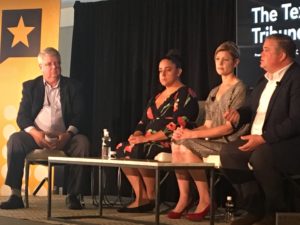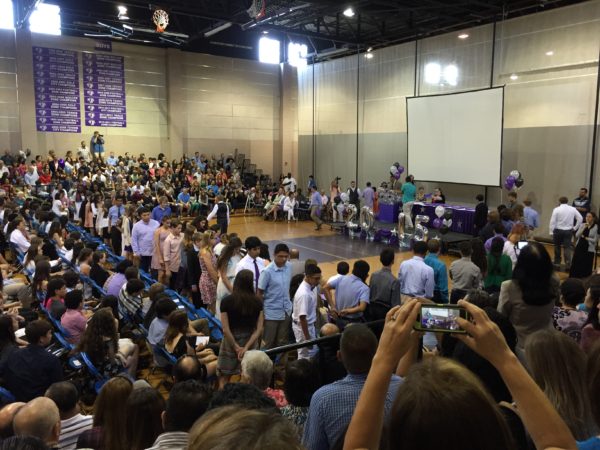(By JAMIE CONNATSER)
Since January 2019, asylum-seekers have been experiencing what has been described by immigrant advocacy groups as one of the most egregious policies thus far, the Migrant Protection Protocols (MPP).
That was the consensus of three members of a panel held during the 2019 Texas Tribune Festival in downtown Austin in late September. The session was described by organizers as a “border’s-eye view” of the migrant crisis from the humanitarians doing the heavy lifting.
“We have thousands of refugees on the other side of the border as a result of some of these inhumane policies,” said panelist Dylan Corbett with the Hope Border Institute, a faith-based group that works with community leaders along the Mexico-U.S. border.

(ACC Photo by Jamie Connatser)
Corbett was joined by Mimi Marziani, president of the Texas Civil Rights Project, and Linda Rivas, executive director of the Las Americas Immigrant Advocacy Center. Rivas helped start the Borderland Immigration Council, made up of attorneys and advocacy groups that try to help immigrants through a myriad of issues.
The discussion was hosted by Robert Moore, CEO of El Paso Matters, a nonprofit news organization that focuses on issues in the El Paso region.
Also known as “Remain in Mexico,” MPP requires asylum-seekers from all over the world to wait in Mexico until their immigration court hearing.
The Mexican government is responsible for providing “appropriate humanitarian protections” during their stay, according to the Department of Homeland Security website.
However, Linda Rivas said asylum-seekers waiting in Ciudad Juarez report dangerous conditions, such as one asylum-seeker “being kidnapped, raped, raped by Mexican military, sexually assaulted in front of their 3-year-old little boy.” She said others feared for their lives for routine things such as going to the grocery store.
“People in Juarez are in extreme danger,” Rivas said.
People seeking asylum are also not allowed due process, according to Rivas. The attorney said most of the time there is no way to talk with her clients before their hearings. She recalled what it’s like to go to court.
“Three attorneys for about 200 people… so only a handful of people were represented that day,” Rivas said. “We’re called up, and we all start to say, ‘Okay, can we speak to our clients?’ Because our clients have been in Mexico.”
Rivas said she has spoken to her clients on Whatsapp the night before.
“You know, if I’m lucky, they’ll have phones, they have the ability to communicate with me,” Rivas said. “They’re in a place where they can access Wi-Fi.“
Rivas said the court administrator then told the three attorneys they need to be speaking to their clients in Mexico.
Rivas said it was the first time she heard a court official tell U.S.-based attorneys to go to Mexico in order to speak to their clients.
The panelists were asked what people in the audience can do to help with the humanitarian efforts along the border.
In addition to monetary donations to the organizations represented on the panel, volunteering is also an option. Rivas said Spanish-speaking volunteers or people with legal experience are needed in El Paso, especially if they can commit to two weeks or more.
Corbett, also based in El Paso, had another way of looking at it.
“The border is where you are. Wherever you are. It’s not just the physical geographical border,” he said. “It’s where you are. There are immigrant detention centers where you are, and we need to push back. There are immigrants that are going to need to be integrated and accompanied where you are. We need legal defense funds throughout the country, not just at the border.”




